About Thailand
Download as pptx, pdf1 like403 views
The document outlines traditional Thai greetings and etiquette, emphasizing respect for Buddhism, the royal family, and older individuals. It includes a brief biography of Angkarn Kalayanapong, a renowned Thai poet and artist, highlighting his major achievements and contributions to literature and art. Additionally, the text presents a poetic reflection on interconnectedness and the choices that shape human experiences in relation to others' diverse realities.
1 of 15
Downloaded 15 times
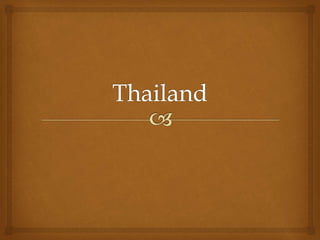
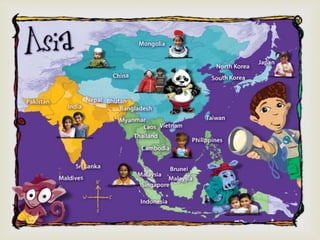
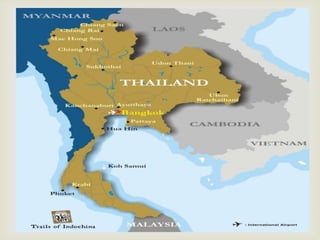
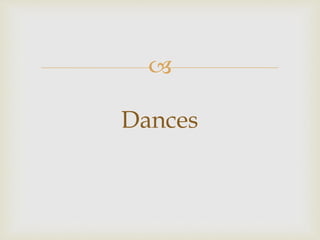
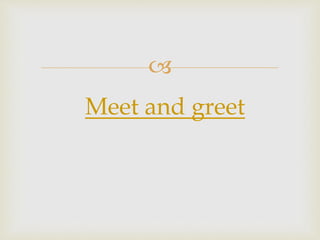
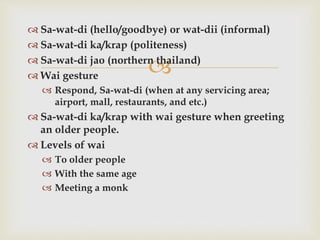
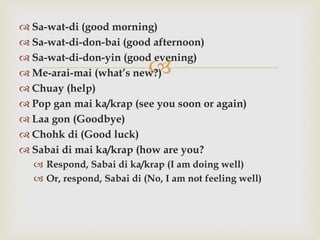
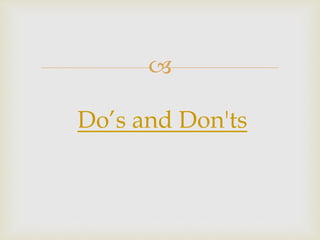
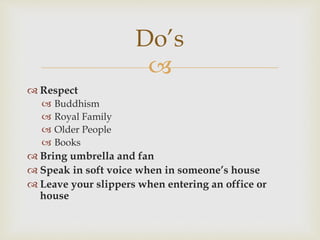
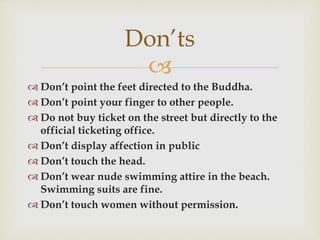
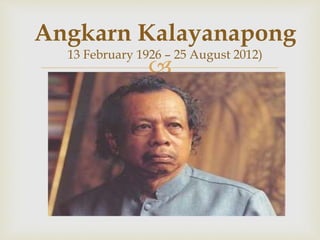
![’é¢
’éÖ He was named a National Artist of Thailand in 1989, and won the
S.E.A. Write Award in 1986.
’éÖ born in Nakhon Si Thammarat Province in Southern Thailand.
’éÖ His father was a sub-district headman (kamnan).
’éÖ As a high school student, he started writing poems.
’éÖ He was admitted to study painting at the art-specialised Silpakorn
University
’éÖ In the 1950s, he became a professional writer.
’éÖ He deviated from the traditional schemes and rules of Thai poetry,
which initially drew him criticism.
’éÖ won the S.E.A. Write Award in 1986 and was named National
Artist of Thailand in the field of literatur in 1989. Next to his poetic
works, Angkarn was noted for his drawings and paintings.[1][2]
’éÖ married and had one son and two daughters. In 2006, he supported
the People's Alliance for Democracy ("Yellow Shirts") in their
protests against Prime Minister Thaksin Shinawatra.
’éÖ After suffering from a long-term heart disease and diabetes,
Angkarn died at the age of 86 in Samitivej Hospital, Bangkok.](https://image.slidesharecdn.com/thailand-151209121307-lva1-app6892/85/About-Thailand-12-320.jpg)
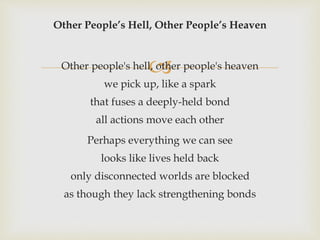
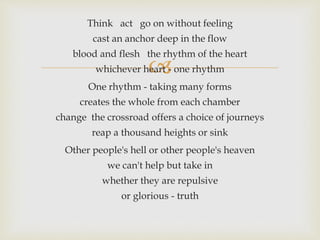
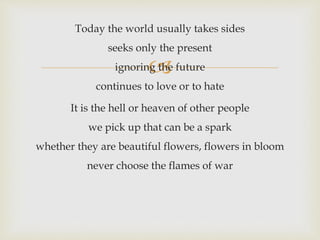
Ad
Recommended
Ic Culture
Ic Cultureguest30ed87
╠²
This document provides information about Thailand and Thai culture. It discusses the Thai flag, government, religion (Buddhism), traditions such as respect for elders and ancestor worship, cuisine including rice and noodles, education system, entertainment such as television dramas, and cultural norms including being polite and respectful. The invisible cultures discussed are religion and religious traditions which shape how people think and act in Thailand.April fool's day
April fool's dayateixidoca1
╠²
April Fool's Day is celebrated annually on April 1st, when people play pranks or jokes on each other, such as covering an office in Post-it notes or gluing a coin to the floor. Many countries around the world, including the UK, US, Australia, France, Germany, New Zealand, Ireland, Brazil, Canada, and Russia, observe this tradition of pranking others on April 1st.Happy April Fool's Day
Happy April Fool's DayRashmi Sinha
╠²
This April Fool's Day message jokes that it added two zeros to the recipient's view count on ║▌║▌▀ŻShare and provides a link to a blog post about April Fool's Day pranks. It acknowledges that the inflated view count was just a joke and apologizes if anyone was upset by the prank.April Fools Day
April Fools DayHariom Seth
╠²
The document outlines several proposed April Fool's Day special shows for a television channel between March 30th and April 1st:
1) An 10-minute "April Fools Prank" show that will advertise unbelievable products at unbelievable prices.
2) A 4-6 minute show honoring celebrities who have stuck to styles and roles of the past. Profile montages and graphics will be used.
3) A 4-minute show where mean VJs embarrass people on the street through graphic inserts.April Fool's Day
April Fool's Dayhorsestar
╠²
April Fool's Day originated in France when children would play pranks on each other after the calendar changed and New Year's Day was moved to January 1st from April 1st. Common French pranks included putting paper fish in others' backpacks and yelling "poisson d'avril". American traditions involved telling others their shoelaces were untied, claiming geese were nearby, or falsely saying school was canceled. College students would also reset each other's clocks as an April Fools' prank. April Fool's Day is meant to be fun and harmless practical jokes.April Fool's Day
April Fool's Dayfengchuishaster
╠²
The history of April Fool's Day dates back to the 16th century when the calendar changed and some people were not aware that the new year celebration was moved from April 1st to January 1st. These unaware people were called "fools". In the 1500s, people began playing tricks on the "fools" on April 1st. Now almost 500 years later, April 1st is still a day for playing harmless tricks and pranks on others in good fun by shouting "April Fools!" after successfully tricking someone into believing something false.Thai Culture
Thai CultureKaye Laririt
╠²
1) Thailand has a culture deeply influenced by Buddhism, with an emphasis on politeness, respect, and avoiding confrontation.
2) Thai society is hierarchical, and people are defined by their relationships and relative statuses. Proper greetings and etiquette are important.
3) The family is the center of Thai culture, and there are strict rules of respect between generations and among siblings. Maintaining family harmony is valued.April fools DAY
April fools DAYpptmania
╠²
April Fool's Day traces its origins to a calendar change in the 16th century when the New Year was moved from April 1st to January 1st, leading some to be labeled 'fools' for not adapting. Over time, the day evolved into a celebration where people play clever, harmless pranks, with different traditions in various cultures such as 'poisson d'avril' in France. The holiday is still observed today as a fun challenge to execute the best tricks, adhering to rules that ensure safety and humor.Delhi to Kasauli Cab | Delhi to Kasauli Taxi
Delhi to Kasauli Cab | Delhi to Kasauli TaxiCab Bazar
╠²
Book Delhi to Kasauli cab online at best price. CabBazar provides car rental services for all cab types AC, Non AC, Hatchback, SUV, Sedan, Innova and Tempo Traveller. Both One way drop taxi and round trip cab available at lowest price. Price starts Rs. 9/Km.Akshat Sethi Pilot ŌĆō Leadership and Excellence in Indian Aviation
Akshat Sethi Pilot ŌĆō Leadership and Excellence in Indian AviationAkshat Sethi
╠²
Akshat Sethi Pilot ŌĆō A Respected and Rising Name in Indian Aviation
From Aspiration to Accomplishment
Born on 28th November 1988 in Bhopal, Akshat Sethi turned a childhood dream into a distinguished career in Indian aviation. Holding a B.Sc in Aviation and a Commercial Pilot License, he began his professional journey with Air IndiaŌĆöone of IndiaŌĆÖs most prominent carriers. There, he gained extensive experience flying long-haul international routes and domestic short-distance flights, developing deep expertise in airspace management, foreign flight regulations, and cockpit discipline under pressure.
AkshatŌĆÖs time at Air India helped shape not just his technical know-how but also his reputation for aviation safety, operational clarity, and calm professionalism. His unwavering commitment to precision, passenger well-being, and flight protocol earned him the admiration of peers and superiors alike. These qualities have since become the cornerstone of his aviation philosophy.
Serving the Skies with the Government of Gujarat
Today, Captain Akshat Sethi plays a vital role in the aviation division of the Government of Gujarat. He is entrusted with sensitive and high-priority missions involving VIP movements and state operationsŌĆötasks that demand not just skill but complete discretion, integrity, and punctuality. His reliability and composed demeanor have earned the trust of senior officials, while his technical agility continues to set benchmarks in government aviation circles.
His role requires real-time decision-making, versatile flight handling, and strict adherence to protocolŌĆöall of which Akshat executes with ease and excellence. His ability to adapt to any flight mission, regardless of its complexity, makes him one of the most dependable pilots in Indian civil aviation today.
Beyond the Cockpit: Culture, Character, and Recognition
Outside the cockpit, Akshat enjoys music and travelŌĆöinterests that reflect his adventurous spirit and cultural curiosity. These hobbies mirror the global lifestyle of an aviator, connecting him with diverse people and places. Fluent in both English and Hindi, he is also learning Gujarati and Punjabi, showcasing his respect for IndiaŌĆÖs linguistic diversity and regional cultures.
As his achievements grow, so does his digital presence. Searches for the term ŌĆ£Akshat Sethi PilotŌĆØ are on the rise, demonstrating not only increasing public recognition but also the inspiration he offers to aspiring pilots. His journey represents more than flyingŌĆöit is about values, consistency, and passion turned into a profession.
AkshatŌĆÖs success is a powerful reminder that aviation excellence isnŌĆÖt just about the number of flying hours; itŌĆÖs rooted in strong character, ethical responsibility, and relentless pursuit of perfection. He stands today as a role model in Indian aviationŌĆöa steady hand in the skies and a grounded leader on the tarmac.How to travel to Amaranth Cave by 2025.pdf
How to travel to Amaranth Cave by 2025.pdfEpicYatra
╠²
Planning your spiritual journey to the sacred Amarnath Cave? ¤Ģē’ĖÅ Whether you're seeking solitude, family bonding, or the joy of group travel ŌĆō each has its own charm!
Ō£ģ Solo: Perfect for peaceful reflection and flexible planning.
¤æ©ŌĆŹ¤æ®ŌĆŹ¤æ¦ŌĆŹ¤æ” Family: Safe, sacred, and creates lifelong memories.
¤æź Group: Budget-friendly, social, and well-organized.
Discover the pros and cons of each and choose the path that best matches your spirit! ¤øĢŌ£©Delhi to Ludhiana Cab | Delhi to Ludhiana Taxi
Delhi to Ludhiana Cab | Delhi to Ludhiana TaxiCab Bazar
╠²
Book Delhi to Ludhiana cab online at best price. CabBazar provides car rental services for all cab types AC, Non AC, Hatchback, SUV, Sedan, Innova and Tempo Traveller. Both One way drop taxi and round trip cab available at lowest price. Price starts Rs. 9/Km.Eric Albuja Share Top 5 Benefits of Contactless Travel Tech.pdf
Eric Albuja Share Top 5 Benefits of Contactless Travel Tech.pdfEric Albuja
╠²
Eric Albuja explores the key benefits of contactless travel technology in this presentation. Discover how digital tools are making travel faster, safer, and more personalized. From touch-free check-ins to real-time updates, contactless tech is transforming the way we move. This overview highlights why it's becoming essential for modern travelers and the future of the global travel industry.
Kerala ŌĆō God's Own Country 2025 edition ppt.x
Kerala ŌĆō God's Own Country 2025 edition ppt.xHaarith Vinesh
╠²
¤ōØ Presentation Description
This presentation titled "Kerala ŌĆō GodŌĆÖs Own Country" gives a brief yet vibrant overview of KeralaŌĆÖs most popular tourist destinations, culture, natural beauty, and the rising influence of social media on travel trends. Information and ideas were supported by online sources like Kerala Tourism, Incredible India, and ChatGPT for content assistance.
¤ö¢ Created by: Haarith VineshTravel with Karthik - Tourism Places in Kadapa
Travel with Karthik - Tourism Places in KadapaGowtham Karthik
╠²
Welcome to Travel with Karthik ŌĆō where every journey is personal, soulful, and unforgettable.
¤īŹ Who I Am
Hi! IŌĆÖm Karthik, the traveler, storyteller, and soul behind Travel with Karthik. IŌĆÖm not your typical travel blogger ticking destinations off a bucket list. My journey isnŌĆÖt about luxurious resorts or Instagram-perfect beachesŌĆöitŌĆÖs about stories, emotions, faith, and finding beauty in the ordinary.
For me, travel is deeply personal. I travel to connect, reflect, and grow. Whether IŌĆÖm sitting by the holy Ganga in Kashi or exploring the rustic charm of Kadapa, I donŌĆÖt just pass through placesŌĆöI try to feel them.Corporate Gift Vouchers for Employees: A Modern Approach to Workplace Rewards
Corporate Gift Vouchers for Employees: A Modern Approach to Workplace RewardsDreamedays.ae
╠²
Companies across the UAE are embracing innovative ways to reward and recognize employees. Among these, DreamDays has emerged as a pioneer by offering experiential gift vouchers that go beyond the ordinary and turn appreciation into unforgettable memories.Travel with Karthik - Tourism Places in Kadapa
Travel with Karthik - Tourism Places in KadapaGowtham Karthik
╠²
Welcome to Travel with Karthik ŌĆō where every journey is personal, soulful, and unforgettable.
¤īŹ Who I Am
Hi! IŌĆÖm Karthik, the traveler, storyteller, and soul behind Travel with Karthik. IŌĆÖm not your typical travel blogger ticking destinations off a bucket list. My journey isnŌĆÖt about luxurious resorts or Instagram-perfect beachesŌĆöitŌĆÖs about stories, emotions, faith, and finding beauty in the ordinary.
For me, travel is deeply personal. I travel to connect, reflect, and grow. Whether IŌĆÖm sitting by the holy Ganga in Kashi or exploring the rustic charm of Kadapa, I donŌĆÖt just pass through placesŌĆöI try to feel them.How to Track Your Train's Location with Live Train Status
How to Track Your Train's Location with Live Train StatusRailRestro: Order Food in Train
╠²
While travelling on trains in India, do you frequently encounter the question: ŌĆ£Where is your trainŌĆØ, by your friends and family? Travellers usually are clueless about the answer to this question. You can, however, answer this question easily with the Live Train Status service.Bhopal to Sehore Cab | Bhopal to Sehore Taxi
Bhopal to Sehore Cab | Bhopal to Sehore TaxiCab Bazar
╠²
Book Bhopal to Sehore cab online at best price. CabBazar provides car rental services for all cab types AC, Non AC, Hatchback, SUV, Sedan, Innova and Tempo Traveller. Both One way drop taxi and round trip cab available at lowest price. Price starts Rs. 9/Km.Top-Rated and Must-See Attractions in West Tennessee
Top-Rated and Must-See Attractions in West TennesseeSoumya Panda
╠²
West Tennessee is a super fun place to visit because it has so many cool things to see and do! ItŌĆÖs famous for its music, like blues and rock ŌĆśnŌĆÖ roll, its yummy barbecue food, and its interesting history. The biggest city is Memphis, but there are also smaller towns and beautiful nature spots that make this area special. Whether you like listening to music, learning about the past, or exploring outdoors, West Tennessee has something for you. LetŌĆÖs check out the best places to visit.
Delhi to Haldwani Cab | Delhi to Haldwani Taxi
Delhi to Haldwani Cab | Delhi to Haldwani TaxiCab Bazar
╠²
Book Delhi to Haldwani cab online at best price. CabBazar provides car rental services for all cab types AC, Non AC, Hatchback, SUV, Sedan, Innova and Tempo Traveller. Both One way drop taxi and round trip cab available at lowest price. Price starts Rs. 9/Km.The 5 Most Secluded Islands of the Seychelles.pdf
The 5 Most Secluded Islands of the Seychelles.pdfSeychelles Times
╠²
Escape to the 5 most secluded islands of SeychellesŌĆöSilhouette, F├®licit├®, Alphonse, North, and Desroches. These hidden gems offer untouched nature, luxury resorts, and total privacy, making them perfect for romantic getaways, nature retreats, or peaceful escapes from the crowds.Best time to book Amarnath Yatra.........
Best time to book Amarnath Yatra.........SuYatra
╠²
Best Time to Book Amarnath Yatra Package by Helicopter for 2025-Planning the sacred journey to the Amarnath Cave is a dream for every devotee of Lord Shiva. Hidden in the snow-clad Himalayas of Jammu and Kashmir, the Amarnath Yatra is a deeply spiritual pilgrimage that draws lakhs of yatris each year. For those looking for a safer, faster, and more comfortable travel experience in 2025, opting for an Amarnath Yatra Package by Helicopter is the perfect solution.Delhi to Katra Cab | Delhi to Katra Taxi
Delhi to Katra Cab | Delhi to Katra TaxiCab Bazar
╠²
Book Delhi to Katra cab online at best price. CabBazar provides car rental services for all cab types AC, Non AC, Hatchback, SUV, Sedan, Innova and Tempo Traveller. Both One way drop taxi and round trip cab available at lowest price. Price starts Rs. 9/Km.Rajshahi Tour.pdf:A place of Peace and Beauty,A clean city ,A great Beauty of...
Rajshahi Tour.pdf:A place of Peace and Beauty,A clean city ,A great Beauty of...dristyhossain12
╠²
Book Description: Rajshahi Tour
Step into the heart of North Bengal with "Rajshahi Tour", a beautifully written guide that gently takes you through the rich history, vibrant culture, and natural charm of Rajshahi, Bangladesh. Whether you're a curious traveler, a history lover, or someone seeking peaceful escapes, this book invites you on a soulful journey through mango orchards, silk towns, ancient palaces, and serene riverbanks.
With soft storytelling and heartfelt insights, "Rajshahi Tour" uncovers the timeless beauty of places like Varendra Research Museum, Puthia Temple City, the historic Sona Mosque, and the majestic Natore Rajbari. Every chapter feels like a quiet walk with a local friend, sharing hidden gems, local flavors, and warm traditions that make Rajshahi truly unforgettable.
Perfect for readers of all ages, this book is not just a travel guideŌĆöit's a celebration of heritage, simplicity, and the kind of beauty that stays with you long after the journey ends.
Let your heart explore Rajshahi, one page at a time.Apply Urgent eVisa Online ( Visa Services )
Apply Urgent eVisa Online ( Visa Services )RanjeetKumar108130
╠²
Need to travel on short notice? Apply for an Urgent eVisa Online and receive fast approval, often within just a few hours. Ideal for tourism, business, medical emergencies, or conferences, this service is fully onlineŌĆöno embassy visits required. Simply complete the application form, upload your passport and photo, and make a secure payment. Once approved, your eVisa is delivered via email and ready to use. Avoid delays and enjoy a quick, smooth, and reliable visa process. Apply now and travel stress-free!
Crystal Waters Await Snorkeling Cruise on a Luxury Catamaran
Crystal Waters Await Snorkeling Cruise on a Luxury CatamaranDelphi Watersports
╠²
Set sail on a luxury catamaran and dive into crystal-clear waters with our unforgettable snorkeling cruise. Explore vibrant coral reefs, swim alongside tropical marine life, and relax on deck with breathtaking ocean views. Perfect for adventure seekers and relaxation lovers alike, this premium experience blends comfort and excitement for the ultimate day on the water.Delhi to Patiala Cab | Delhi to Patiala Taxi
Delhi to Patiala Cab | Delhi to Patiala TaxiCab Bazar
╠²
Book Delhi to Patiala cab online at best price. CabBazar provides car rental services for all cab types AC, Non AC, Hatchback, SUV, Sedan, Innova and Tempo Traveller. Both One way drop taxi and round trip cab available at lowest price. Price starts Rs. 9/Km.2024 Trend Updates: What Really Works In SEO & Content Marketing
2024 Trend Updates: What Really Works In SEO & Content MarketingSearch Engine Journal
╠²
The document outlines key SEO and content marketing trends for 2024, emphasizing the impact of AI, the importance of E-E-A-T (Experience, Expertise, Authoritativeness, Trustworthiness), and a shift towards user-centric content strategies. It advises against focusing on outdated trends like voice search and stresses the need for creating value-driven, authoritative content. Additionally, it highlights the need to leverage AI as a supportive tool rather than relying solely on it for content creation.Storytelling For The Web: Integrate Storytelling in your Design Process
Storytelling For The Web: Integrate Storytelling in your Design ProcessChiara Aliotta
╠²
The document outlines a livestream presentation by Chiara Aliotta on integrating storytelling into web design to enhance user experiences. It covers the storytelling process for designers, emphasizing aspects such as understanding the audience, structuring narratives, and creating emotional connections. The presentation also includes case studies and practical examples to demonstrate effective storytelling in UX/UI design.More Related Content
Recently uploaded (20)
Delhi to Kasauli Cab | Delhi to Kasauli Taxi
Delhi to Kasauli Cab | Delhi to Kasauli TaxiCab Bazar
╠²
Book Delhi to Kasauli cab online at best price. CabBazar provides car rental services for all cab types AC, Non AC, Hatchback, SUV, Sedan, Innova and Tempo Traveller. Both One way drop taxi and round trip cab available at lowest price. Price starts Rs. 9/Km.Akshat Sethi Pilot ŌĆō Leadership and Excellence in Indian Aviation
Akshat Sethi Pilot ŌĆō Leadership and Excellence in Indian AviationAkshat Sethi
╠²
Akshat Sethi Pilot ŌĆō A Respected and Rising Name in Indian Aviation
From Aspiration to Accomplishment
Born on 28th November 1988 in Bhopal, Akshat Sethi turned a childhood dream into a distinguished career in Indian aviation. Holding a B.Sc in Aviation and a Commercial Pilot License, he began his professional journey with Air IndiaŌĆöone of IndiaŌĆÖs most prominent carriers. There, he gained extensive experience flying long-haul international routes and domestic short-distance flights, developing deep expertise in airspace management, foreign flight regulations, and cockpit discipline under pressure.
AkshatŌĆÖs time at Air India helped shape not just his technical know-how but also his reputation for aviation safety, operational clarity, and calm professionalism. His unwavering commitment to precision, passenger well-being, and flight protocol earned him the admiration of peers and superiors alike. These qualities have since become the cornerstone of his aviation philosophy.
Serving the Skies with the Government of Gujarat
Today, Captain Akshat Sethi plays a vital role in the aviation division of the Government of Gujarat. He is entrusted with sensitive and high-priority missions involving VIP movements and state operationsŌĆötasks that demand not just skill but complete discretion, integrity, and punctuality. His reliability and composed demeanor have earned the trust of senior officials, while his technical agility continues to set benchmarks in government aviation circles.
His role requires real-time decision-making, versatile flight handling, and strict adherence to protocolŌĆöall of which Akshat executes with ease and excellence. His ability to adapt to any flight mission, regardless of its complexity, makes him one of the most dependable pilots in Indian civil aviation today.
Beyond the Cockpit: Culture, Character, and Recognition
Outside the cockpit, Akshat enjoys music and travelŌĆöinterests that reflect his adventurous spirit and cultural curiosity. These hobbies mirror the global lifestyle of an aviator, connecting him with diverse people and places. Fluent in both English and Hindi, he is also learning Gujarati and Punjabi, showcasing his respect for IndiaŌĆÖs linguistic diversity and regional cultures.
As his achievements grow, so does his digital presence. Searches for the term ŌĆ£Akshat Sethi PilotŌĆØ are on the rise, demonstrating not only increasing public recognition but also the inspiration he offers to aspiring pilots. His journey represents more than flyingŌĆöit is about values, consistency, and passion turned into a profession.
AkshatŌĆÖs success is a powerful reminder that aviation excellence isnŌĆÖt just about the number of flying hours; itŌĆÖs rooted in strong character, ethical responsibility, and relentless pursuit of perfection. He stands today as a role model in Indian aviationŌĆöa steady hand in the skies and a grounded leader on the tarmac.How to travel to Amaranth Cave by 2025.pdf
How to travel to Amaranth Cave by 2025.pdfEpicYatra
╠²
Planning your spiritual journey to the sacred Amarnath Cave? ¤Ģē’ĖÅ Whether you're seeking solitude, family bonding, or the joy of group travel ŌĆō each has its own charm!
Ō£ģ Solo: Perfect for peaceful reflection and flexible planning.
¤æ©ŌĆŹ¤æ®ŌĆŹ¤æ¦ŌĆŹ¤æ” Family: Safe, sacred, and creates lifelong memories.
¤æź Group: Budget-friendly, social, and well-organized.
Discover the pros and cons of each and choose the path that best matches your spirit! ¤øĢŌ£©Delhi to Ludhiana Cab | Delhi to Ludhiana Taxi
Delhi to Ludhiana Cab | Delhi to Ludhiana TaxiCab Bazar
╠²
Book Delhi to Ludhiana cab online at best price. CabBazar provides car rental services for all cab types AC, Non AC, Hatchback, SUV, Sedan, Innova and Tempo Traveller. Both One way drop taxi and round trip cab available at lowest price. Price starts Rs. 9/Km.Eric Albuja Share Top 5 Benefits of Contactless Travel Tech.pdf
Eric Albuja Share Top 5 Benefits of Contactless Travel Tech.pdfEric Albuja
╠²
Eric Albuja explores the key benefits of contactless travel technology in this presentation. Discover how digital tools are making travel faster, safer, and more personalized. From touch-free check-ins to real-time updates, contactless tech is transforming the way we move. This overview highlights why it's becoming essential for modern travelers and the future of the global travel industry.
Kerala ŌĆō God's Own Country 2025 edition ppt.x
Kerala ŌĆō God's Own Country 2025 edition ppt.xHaarith Vinesh
╠²
¤ōØ Presentation Description
This presentation titled "Kerala ŌĆō GodŌĆÖs Own Country" gives a brief yet vibrant overview of KeralaŌĆÖs most popular tourist destinations, culture, natural beauty, and the rising influence of social media on travel trends. Information and ideas were supported by online sources like Kerala Tourism, Incredible India, and ChatGPT for content assistance.
¤ö¢ Created by: Haarith VineshTravel with Karthik - Tourism Places in Kadapa
Travel with Karthik - Tourism Places in KadapaGowtham Karthik
╠²
Welcome to Travel with Karthik ŌĆō where every journey is personal, soulful, and unforgettable.
¤īŹ Who I Am
Hi! IŌĆÖm Karthik, the traveler, storyteller, and soul behind Travel with Karthik. IŌĆÖm not your typical travel blogger ticking destinations off a bucket list. My journey isnŌĆÖt about luxurious resorts or Instagram-perfect beachesŌĆöitŌĆÖs about stories, emotions, faith, and finding beauty in the ordinary.
For me, travel is deeply personal. I travel to connect, reflect, and grow. Whether IŌĆÖm sitting by the holy Ganga in Kashi or exploring the rustic charm of Kadapa, I donŌĆÖt just pass through placesŌĆöI try to feel them.Corporate Gift Vouchers for Employees: A Modern Approach to Workplace Rewards
Corporate Gift Vouchers for Employees: A Modern Approach to Workplace RewardsDreamedays.ae
╠²
Companies across the UAE are embracing innovative ways to reward and recognize employees. Among these, DreamDays has emerged as a pioneer by offering experiential gift vouchers that go beyond the ordinary and turn appreciation into unforgettable memories.Travel with Karthik - Tourism Places in Kadapa
Travel with Karthik - Tourism Places in KadapaGowtham Karthik
╠²
Welcome to Travel with Karthik ŌĆō where every journey is personal, soulful, and unforgettable.
¤īŹ Who I Am
Hi! IŌĆÖm Karthik, the traveler, storyteller, and soul behind Travel with Karthik. IŌĆÖm not your typical travel blogger ticking destinations off a bucket list. My journey isnŌĆÖt about luxurious resorts or Instagram-perfect beachesŌĆöitŌĆÖs about stories, emotions, faith, and finding beauty in the ordinary.
For me, travel is deeply personal. I travel to connect, reflect, and grow. Whether IŌĆÖm sitting by the holy Ganga in Kashi or exploring the rustic charm of Kadapa, I donŌĆÖt just pass through placesŌĆöI try to feel them.How to Track Your Train's Location with Live Train Status
How to Track Your Train's Location with Live Train StatusRailRestro: Order Food in Train
╠²
While travelling on trains in India, do you frequently encounter the question: ŌĆ£Where is your trainŌĆØ, by your friends and family? Travellers usually are clueless about the answer to this question. You can, however, answer this question easily with the Live Train Status service.Bhopal to Sehore Cab | Bhopal to Sehore Taxi
Bhopal to Sehore Cab | Bhopal to Sehore TaxiCab Bazar
╠²
Book Bhopal to Sehore cab online at best price. CabBazar provides car rental services for all cab types AC, Non AC, Hatchback, SUV, Sedan, Innova and Tempo Traveller. Both One way drop taxi and round trip cab available at lowest price. Price starts Rs. 9/Km.Top-Rated and Must-See Attractions in West Tennessee
Top-Rated and Must-See Attractions in West TennesseeSoumya Panda
╠²
West Tennessee is a super fun place to visit because it has so many cool things to see and do! ItŌĆÖs famous for its music, like blues and rock ŌĆśnŌĆÖ roll, its yummy barbecue food, and its interesting history. The biggest city is Memphis, but there are also smaller towns and beautiful nature spots that make this area special. Whether you like listening to music, learning about the past, or exploring outdoors, West Tennessee has something for you. LetŌĆÖs check out the best places to visit.
Delhi to Haldwani Cab | Delhi to Haldwani Taxi
Delhi to Haldwani Cab | Delhi to Haldwani TaxiCab Bazar
╠²
Book Delhi to Haldwani cab online at best price. CabBazar provides car rental services for all cab types AC, Non AC, Hatchback, SUV, Sedan, Innova and Tempo Traveller. Both One way drop taxi and round trip cab available at lowest price. Price starts Rs. 9/Km.The 5 Most Secluded Islands of the Seychelles.pdf
The 5 Most Secluded Islands of the Seychelles.pdfSeychelles Times
╠²
Escape to the 5 most secluded islands of SeychellesŌĆöSilhouette, F├®licit├®, Alphonse, North, and Desroches. These hidden gems offer untouched nature, luxury resorts, and total privacy, making them perfect for romantic getaways, nature retreats, or peaceful escapes from the crowds.Best time to book Amarnath Yatra.........
Best time to book Amarnath Yatra.........SuYatra
╠²
Best Time to Book Amarnath Yatra Package by Helicopter for 2025-Planning the sacred journey to the Amarnath Cave is a dream for every devotee of Lord Shiva. Hidden in the snow-clad Himalayas of Jammu and Kashmir, the Amarnath Yatra is a deeply spiritual pilgrimage that draws lakhs of yatris each year. For those looking for a safer, faster, and more comfortable travel experience in 2025, opting for an Amarnath Yatra Package by Helicopter is the perfect solution.Delhi to Katra Cab | Delhi to Katra Taxi
Delhi to Katra Cab | Delhi to Katra TaxiCab Bazar
╠²
Book Delhi to Katra cab online at best price. CabBazar provides car rental services for all cab types AC, Non AC, Hatchback, SUV, Sedan, Innova and Tempo Traveller. Both One way drop taxi and round trip cab available at lowest price. Price starts Rs. 9/Km.Rajshahi Tour.pdf:A place of Peace and Beauty,A clean city ,A great Beauty of...
Rajshahi Tour.pdf:A place of Peace and Beauty,A clean city ,A great Beauty of...dristyhossain12
╠²
Book Description: Rajshahi Tour
Step into the heart of North Bengal with "Rajshahi Tour", a beautifully written guide that gently takes you through the rich history, vibrant culture, and natural charm of Rajshahi, Bangladesh. Whether you're a curious traveler, a history lover, or someone seeking peaceful escapes, this book invites you on a soulful journey through mango orchards, silk towns, ancient palaces, and serene riverbanks.
With soft storytelling and heartfelt insights, "Rajshahi Tour" uncovers the timeless beauty of places like Varendra Research Museum, Puthia Temple City, the historic Sona Mosque, and the majestic Natore Rajbari. Every chapter feels like a quiet walk with a local friend, sharing hidden gems, local flavors, and warm traditions that make Rajshahi truly unforgettable.
Perfect for readers of all ages, this book is not just a travel guideŌĆöit's a celebration of heritage, simplicity, and the kind of beauty that stays with you long after the journey ends.
Let your heart explore Rajshahi, one page at a time.Apply Urgent eVisa Online ( Visa Services )
Apply Urgent eVisa Online ( Visa Services )RanjeetKumar108130
╠²
Need to travel on short notice? Apply for an Urgent eVisa Online and receive fast approval, often within just a few hours. Ideal for tourism, business, medical emergencies, or conferences, this service is fully onlineŌĆöno embassy visits required. Simply complete the application form, upload your passport and photo, and make a secure payment. Once approved, your eVisa is delivered via email and ready to use. Avoid delays and enjoy a quick, smooth, and reliable visa process. Apply now and travel stress-free!
Crystal Waters Await Snorkeling Cruise on a Luxury Catamaran
Crystal Waters Await Snorkeling Cruise on a Luxury CatamaranDelphi Watersports
╠²
Set sail on a luxury catamaran and dive into crystal-clear waters with our unforgettable snorkeling cruise. Explore vibrant coral reefs, swim alongside tropical marine life, and relax on deck with breathtaking ocean views. Perfect for adventure seekers and relaxation lovers alike, this premium experience blends comfort and excitement for the ultimate day on the water.Delhi to Patiala Cab | Delhi to Patiala Taxi
Delhi to Patiala Cab | Delhi to Patiala TaxiCab Bazar
╠²
Book Delhi to Patiala cab online at best price. CabBazar provides car rental services for all cab types AC, Non AC, Hatchback, SUV, Sedan, Innova and Tempo Traveller. Both One way drop taxi and round trip cab available at lowest price. Price starts Rs. 9/Km.Featured (20)
2024 Trend Updates: What Really Works In SEO & Content Marketing
2024 Trend Updates: What Really Works In SEO & Content MarketingSearch Engine Journal
╠²
The document outlines key SEO and content marketing trends for 2024, emphasizing the impact of AI, the importance of E-E-A-T (Experience, Expertise, Authoritativeness, Trustworthiness), and a shift towards user-centric content strategies. It advises against focusing on outdated trends like voice search and stresses the need for creating value-driven, authoritative content. Additionally, it highlights the need to leverage AI as a supportive tool rather than relying solely on it for content creation.Storytelling For The Web: Integrate Storytelling in your Design Process
Storytelling For The Web: Integrate Storytelling in your Design ProcessChiara Aliotta
╠²
The document outlines a livestream presentation by Chiara Aliotta on integrating storytelling into web design to enhance user experiences. It covers the storytelling process for designers, emphasizing aspects such as understanding the audience, structuring narratives, and creating emotional connections. The presentation also includes case studies and practical examples to demonstrate effective storytelling in UX/UI design.Artificial Intelligence, Data and Competition ŌĆō SCHREPEL ŌĆō June 2024 OECD dis...
Artificial Intelligence, Data and Competition ŌĆō SCHREPEL ŌĆō June 2024 OECD dis...OECD Directorate for Financial and Enterprise Affairs
╠²
This presentation by Thibault Schrepel, Associate Professor of Law at Vrije Universiteit Amsterdam University, was made during the discussion ŌĆ£Artificial Intelligence, Data and CompetitionŌĆØ held at the 143rd meeting of the OECD Competition Committee on 12 June 2024. More papers and presentations on the topic can be found at oe.cd/aicomp.
This presentation was uploaded with the authorŌĆÖs consent.
How to Leverage AI to Boost Employee Wellness - Lydia Di Francesco - SocialHR...
How to Leverage AI to Boost Employee Wellness - Lydia Di Francesco - SocialHR...SocialHRCamp
╠²
The document discusses leveraging AI to enhance employee wellness through data analytics, automating tasks, and personalized wellness apps, emphasizing the shared responsibility of employee well-being between leaders and organizations. It outlines best practices for using AI in wellness strategies, including ensuring data privacy and security, understanding employee needs, and promoting inclusivity. Lydia Di Francesco, a wellness specialist, shares insights to optimize workplace wellness strategy using AI-driven data analytics and encourages collaboration and transparency.2024 State of Marketing Report ŌĆō by Hubspot
2024 State of Marketing Report ŌĆō by HubspotMarius Sescu
╠²
The State of Marketing 2024 report highlights the transformative impact of AI and automation, emphasizing the importance of personalization and engagement to drive growth in a competitive landscape. Marketers are focusing on optimizing budgets, leveraging social media for brand awareness, and utilizing AI tools to enhance efficiency across tasks. Key trends for 2024 include the rise of experiential marketing, content creation that meets user needs, and strengthened connections through personalized customer experiences.Everything You Need To Know About ChatGPT
Everything You Need To Know About ChatGPTExpeed Software
╠²
ChatGPT is an AI chatbot developed by OpenAI, built on advanced language models to facilitate human-like conversational interactions. Launched in November 2022, it utilizes a transformer architecture to understand and generate text, with applications ranging from content creation to customer service. Despite its capabilities, there are concerns about potential misuse and biases in its responses, which OpenAI aims to mitigate through moderation and user feedback.Product Design Trends in 2024 | Teenage Engineerings
Product Design Trends in 2024 | Teenage EngineeringsPixeldarts
╠²
The realm of product design is a constantly changing environment where technology and style intersect. Every year introduces fresh challenges and exciting trends that mold the future of this captivating art form. In this piece, we delve into the significant trends set to influence the look and functionality of product design in the year 2024.How Race, Age and Gender Shape Attitudes Towards Mental Health
How Race, Age and Gender Shape Attitudes Towards Mental HealthThinkNow
╠²
The November 2023 mental health report indicates that 70% of respondents rate their mental health as 'good' or 'excellent,' with higher diagnoses reported among African Americans and non-Hispanic whites compared to Hispanics and Asians. Younger generations, particularly Gen Z and millennials, are more likely to experience mental health challenges, seek information online, and report that their mental health impacts their work and relationships. Half of the respondents feel comfortable discussing their mental health with professionals, although Gen Z shows the least comfort in this area.AI Trends in Creative Operations 2024 by Artwork Flow.pdf
AI Trends in Creative Operations 2024 by Artwork Flow.pdfmarketingartwork
╠²
Creative operations teams expect increased AI use in 2024. Currently, over half of tasks are not AI-enabled, but this is expected to decrease in the coming year. ChatGPT is the most popular AI tool currently. Business leaders are more actively exploring AI benefits than individual contributors. Most respondents do not believe AI will impact workforce size in 2024. However, some inhibitions still exist around AI accuracy and lack of understanding. Creatives primarily want to use AI to save time on mundane tasks and boost productivity.Skeleton Culture Code
Skeleton Culture CodeSkeleton Technologies
╠²
Organizational culture includes values, norms, systems, symbols, language, assumptions, beliefs, and habits that influence employee behaviors and how people interpret those behaviors. It is important because culture can help or hinder a company's success. Some key aspects of Netflix's culture that help it achieve results include hiring smartly so every position has stars, focusing on attitude over just aptitude, and having a strict policy against peacocks, whiners, and jerks.PEPSICO Presentation to CAGNY Conference Feb 2024
PEPSICO Presentation to CAGNY Conference Feb 2024Neil Kimberley
╠²
PepsiCo provided a safe harbor statement noting that any forward-looking statements are based on currently available information and are subject to risks and uncertainties. It also provided information on non-GAAP measures and directing readers to its website for disclosure and reconciliation. The document then discussed PepsiCo's business overview, including that it is a global beverage and convenient food company with iconic brands, $91 billion in net revenue in 2023, and nearly $14 billion in core operating profit. It operates through a divisional structure with a focus on local consumers.Content Methodology: A Best Practices Report (Webinar)
Content Methodology: A Best Practices Report (Webinar)contently
╠²
This document provides an overview of content methodology best practices. It defines content methodology as establishing objectives, KPIs, and a culture of continuous learning and iteration. An effective methodology focuses on connecting with audiences, creating optimal content, and optimizing processes. It also discusses why a methodology is needed due to the competitive landscape, proliferation of channels, and opportunities for improvement. Components of an effective methodology include defining objectives and KPIs, audience analysis, identifying opportunities, and evaluating resources. The document concludes with recommendations around creating a content plan, testing and optimizing content over 90 days.How to Prepare For a Successful Job Search for 2024
How to Prepare For a Successful Job Search for 2024Albert Qian
╠²
The document provides guidance on preparing a job search for 2024. It discusses the state of the job market, focusing on growth in AI and healthcare but also continued layoffs. It recommends figuring out what you want to do by researching interests and skills, then conducting informational interviews. The job search should involve building a personal brand on LinkedIn, actively applying to jobs, tailoring resumes and interviews, maintaining job hunting as a habit, and continuing self-improvement. Once hired, the document advises setting new goals and keeping skills and networking active in case of future opportunities.Social Media Marketing Trends 2024 // The Global Indie Insights
Social Media Marketing Trends 2024 // The Global Indie InsightsKurio // The Social Media Age(ncy)
╠²
The 2024 social media marketing trends report highlights significant shifts influenced by generative AI, including the emergence of personalized content, the rise of virtual influencers, and a stronger focus on user-generated content. Insights were gathered from 33 experts across 23 leading independent agencies, providing a perspective that emphasizes creativity and authenticity in marketing strategies. Key trends also include the blending of B2B and B2C approaches, reflecting changes in consumer behavior and the evolving landscape of social media engagement.Trends In Paid Search: Navigating The Digital Landscape In 2024
Trends In Paid Search: Navigating The Digital Landscape In 2024Search Engine Journal
╠²
The document discusses trends in paid search for 2024, highlighting changes in user behavior, the implications for financial services, and privacy challenges. It emphasizes the importance of adapting search strategies, utilizing AI-driven tools like performance max and smart bidding, and leveraging first-party data for better marketing efficacy. Key takeaways include holistic SEO and SEM approaches, monitoring shifting user intents, and the need for continuous performance evaluation.5 Public speaking tips from TED - Visualized summary
5 Public speaking tips from TED - Visualized summarySpeakerHub
╠²
The document outlines five public speaking tips from Chris Anderson, TED Talks curator, emphasizing the importance of eye contact, vulnerability, humor, humility, and storytelling. These skills are presented as essential for engaging audiences effectively and are increasingly valuable in today's economy. The article posits that mastering these techniques can enhance speakers' ability to communicate ideas powerfully.ChatGPT and the Future of Work - Clark Boyd
ChatGPT and the Future of Work - Clark Boyd Clark Boyd
╠²
The document provides an overview of generative AI, particularly focusing on ChatGPT and its implications for business and the job market. It discusses the rapid growth of generative AI, its applications in marketing, and the skills needed for the AI era while addressing potential job displacement and the need for adaptation. The agenda includes a Q&A session and emphasizes rethinking work in collaboration with AI technology.Getting into the tech field. what next
Getting into the tech field. what next Tessa Mero
╠²
The document provides career advice for getting into the tech field, including:
- Doing projects and internships in college to build a portfolio.
- Learning about different roles and technologies through industry research.
- Contributing to open source projects to build experience and network.
- Developing a personal brand through a website and social media presence.
- Networking through events, communities, and finding a mentor.
- Practicing interviews through mock interviews and whiteboarding coding questions.Google's Just Not That Into You: Understanding Core Updates & Search Intent
Google's Just Not That Into You: Understanding Core Updates & Search IntentLily Ray
╠²
1. Core updates from Google periodically change how its algorithms assess and rank websites and pages. This can impact rankings through shifts in user intent, site quality issues being caught up to, world events influencing queries, and overhauls to search like the E-A-T framework.
2. There are many possible user intents beyond just transactional, navigational and informational. Identifying intent shifts is important during core updates. Sites may need to optimize for new intents through different content types and sections.
3. Responding effectively to core updates requires analyzing "before and after" data to understand changes, identifying new intents or page types, and ensuring content matches appropriate intents across video, images, knowledge graphs and more.How to have difficult conversations
How to have difficult conversations Rajiv Jayarajah, MAppComm, ACC
╠²
The document provides essential tips on how to handle difficult conversations in a workplace setting, emphasizing the importance of preparation, environment, and timing. It highlights that many employees dread such conversations, often leading to avoidance and worsening situations. Ultimately, the guide aims to promote positive outcomes while maintaining professional relationships.Artificial Intelligence, Data and Competition ŌĆō SCHREPEL ŌĆō June 2024 OECD dis...
Artificial Intelligence, Data and Competition ŌĆō SCHREPEL ŌĆō June 2024 OECD dis...OECD Directorate for Financial and Enterprise Affairs
╠²
Ad
About Thailand
- 2. ’é¢
- 3. ’é¢
- 4. ’é¢ Dances
- 6. ’é¢ ’éÖ Sa-wat-di (hello/goodbye) or wat-dii (informal) ’éÖ Sa-wat-di ka/krap (politeness) ’éÖ Sa-wat-di jao (northern thailand) ’éÖ Wai gesture ’é¢ Respond, Sa-wat-di (when at any servicing area; airport, mall, restaurants, and etc.) ’éÖ Sa-wat-di ka/krap with wai gesture when greeting an older people. ’éÖ Levels of wai ’é¢ To older people ’é¢ With the same age ’é¢ Meeting a monk
- 7. ’é¢ ’éÖ Sa-wat-di (good morning) ’éÖ Sa-wat-di-don-bai (good afternoon) ’éÖ Sa-wat-di-don-yin (good evening) ’éÖ Me-arai-mai (whatŌĆÖs new?) ’éÖ Chuay (help) ’éÖ Pop gan mai ka/krap (see you soon or again) ’éÖ Laa gon (Goodbye) ’éÖ Chohk di (Good luck) ’éÖ Sabai di mai ka/krap (how are you? ’é¢ Respond, Sabai di ka/krap (I am doing well) ’é¢ Or, respond, Sabai di (No, I am not feeling well)
- 9. ’é¢ ’éÖ Respect ’é¢ Buddhism ’é¢ Royal Family ’é¢ Older People ’é¢ Books ’éÖ Bring umbrella and fan ’éÖ Speak in soft voice when in someoneŌĆÖs house ’éÖ Leave your slippers when entering an office or house DoŌĆÖs
- 10. ’é¢ ’éÖ DonŌĆÖt point the feet directed to the Buddha. ’éÖ DonŌĆÖt point your finger to other people. ’éÖ Do not buy ticket on the street but directly to the official ticketing office. ’éÖ DonŌĆÖt display affection in public ’éÖ DonŌĆÖt touch the head. ’éÖ DonŌĆÖt wear nude swimming attire in the beach. Swimming suits are fine. ’éÖ DonŌĆÖt touch women without permission. DonŌĆÖts
- 11. ’é¢ Angkarn Kalayanapong 13 February 1926 ŌĆō 25 August 2012)
- 12. ’é¢ ’éÖ He was named a National Artist of Thailand in 1989, and won the S.E.A. Write Award in 1986. ’éÖ born in Nakhon Si Thammarat Province in Southern Thailand. ’éÖ His father was a sub-district headman (kamnan). ’éÖ As a high school student, he started writing poems. ’éÖ He was admitted to study painting at the art-specialised Silpakorn University ’éÖ In the 1950s, he became a professional writer. ’éÖ He deviated from the traditional schemes and rules of Thai poetry, which initially drew him criticism. ’éÖ won the S.E.A. Write Award in 1986 and was named National Artist of Thailand in the field of literatur in 1989. Next to his poetic works, Angkarn was noted for his drawings and paintings.[1][2] ’éÖ married and had one son and two daughters. In 2006, he supported the People's Alliance for Democracy ("Yellow Shirts") in their protests against Prime Minister Thaksin Shinawatra. ’éÖ After suffering from a long-term heart disease and diabetes, Angkarn died at the age of 86 in Samitivej Hospital, Bangkok.
- 13. ’é¢ Other PeopleŌĆÖs Hell, Other PeopleŌĆÖs Heaven Other people's hell, other people's heaven we pick up, like a spark that fuses a deeply-held bond all actions move each other Perhaps everything we can see looks like lives held back only disconnected worlds are blocked as though they lack strengthening bonds
- 14. ’é¢ Think act go on without feeling cast an anchor deep in the flow blood and flesh the rhythm of the heart whichever heart - one rhythm One rhythm - taking many forms creates the whole from each chamber change the crossroad offers a choice of journeys reap a thousand heights or sink Other people's hell or other people's heaven we can't help but take in whether they are repulsive or glorious - truth
- 15. ’é¢ Today the world usually takes sides seeks only the present ignoring the future continues to love or to hate It is the hell or heaven of other people we pick up that can be a spark whether they are beautiful flowers, flowers in bloom never choose the flames of war
